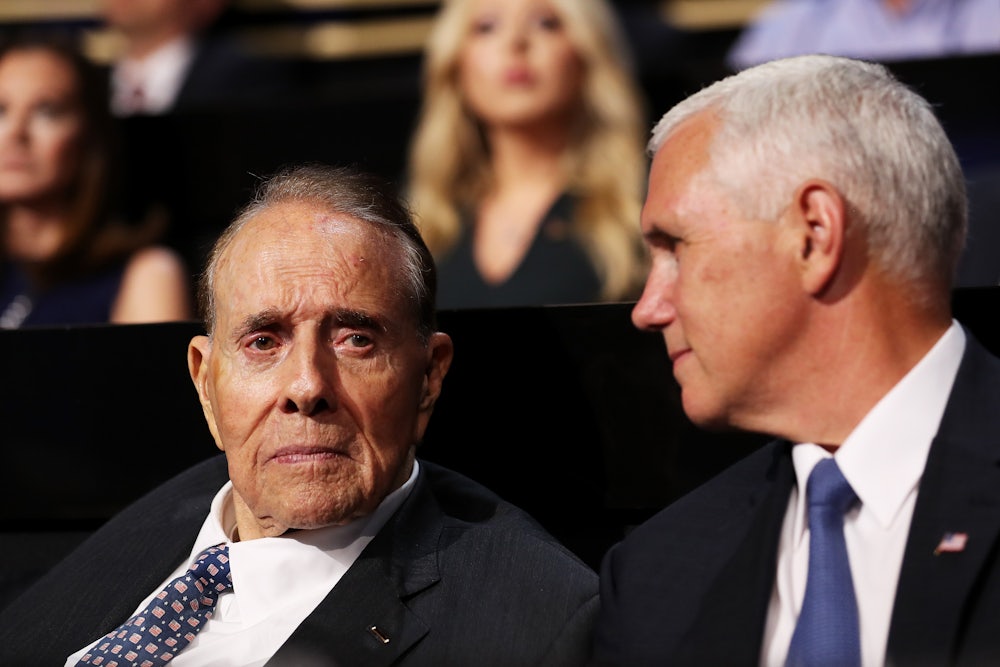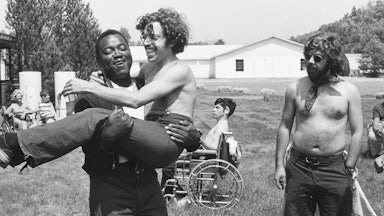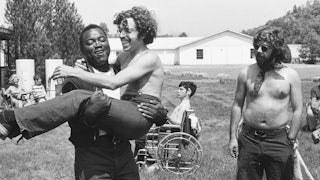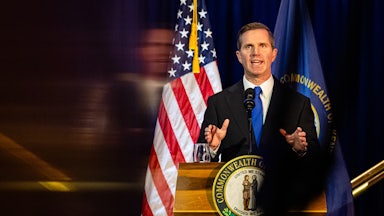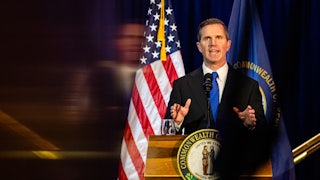In 1969, Bob Dole gave his maiden speech on the Senate floor on a topic with which he was intimately acquainted. From the moment he lost the use of his right arm and the feeling in his left, in Italy as a soldier in World War II, the challenges of a world not built for disabled people animated both Dole’s life and his political persona: Journalists familiarized readers with his trademark strategies, from holding a pen in his right hand to keep his fingers from splaying to wearing loafers, since he couldn’t tie his shoes. More importantly, the impact of it on his life shaped his ideas and played a role in his own determinations about whom he hired.
In that first address to the Senate, Dole told the story of a man who became a paraplegic and was referred to the state-federal vocational rehabilitation office, which enabled him to get a job as an insurance agent, have a new home, and adopt a child. “It takes place now because the Congress and the federal government initiated and guided a vital, vigorous program of vocational rehabilitation,” he said.
Dole’s praise of a federal government program was surprising given his role as a Republican “hatchet man.” At different points, Dole served as Republican National Committee chairman under Richard Nixon; Gerald Ford’s running mate in 1976; Senate majority leader; and thrice as presidential candidate, his last foray coming in 1996 as the GOP standard-bearer who could not prevent Bill Clinton’s reelection.
At the same time, Dole was a consummate dealmaker whose efforts helped bring about the Americans With Disabilities Act, which he co-sponsored not just with Republicans such as John McCain and Orrin Hatch but with prominent liberal Democrats like Ted Kennedy and Tom Harkin, as well. President George H.W. Bush would sign the bipartisan bill into law.
“The fact that the ADA was bipartisan was hugely important, and Senator Dole was a key player in that,” said Chai Feldblum, the lead attorney on the team that drew up the bill. Feldblum’s words are all the more remarkable considering she more famously worked as the legislative counsel of the American Civil Liberties Union’s AIDS Project, and they illustrate how concern for disabled people once spanned the wider political spectrum, from liberals like her to Republicans like Justin Dart and Evan Kemp, who served on the Equal Employment Opportunity Commission during the Reagan and Bush administrations.
Dole’s passing on Sunday has allowed Washington, D.C., to engage in one of its favorite activities—reminiscing on the days when bipartisanship reigned; the ADA looms large as a prime example. But it also forces a round of uncomfortable questions, regarding the way the Republican Party has strayed from Dole’s heyday, abandoning the positions on disability rights it once proudly defended.
“The history of the Republican [Party] writ large in the area of civil rights, up until recently, there’s been a strong and sustained advocacy for civil rights,” said Tom Ridge, who was a Republican congressman at the time of the ADA’s passage and is now chairman of the National Organization on Disability. Ridge’s words about the decline of bipartisanship on disability aren’t empty “party of Lincoln” platitudes: Dole voted for the Civil Rights Act as well as the Voting Rights Act; he brokered a compromise that helped extend the Voting Rights Act in 1982 with future ADA collaborator Kennedy.
“Regrettably, there hasn’t been as strong a champion within the Republican Party since he left the Congress,” said Ridge.
The arc of Dole’s political career traces the trajectory of a Republican Party that largely gave up on governing in favor of promulgating a scorched-earth form of politics as America entered the 1990s. Similarly, as the Republican Party has shifted from being a party that focuses on using government to enact conservative policies to a party that simply wants to defang government, it might mean the end of the old way of disability advocacy and the successes it wrought.
Dole’s introduction to disability was inextricably linked to a desire for bipartisanship. As he recovered at Percy Jones Hospital, Dole met future Democratic Senators Phil Hart and Daniel Inouye. His recovery would also guide Capitol Hill’s debates in a direction favorable to the disabled.
“I was a nurse, and he liked me because a lot of nurses helped him get through his disability after World War II,” said Maureen “Mo” West, who was Dole’s adviser on disability during the debate around the Americans With Disabilities Act, noting that Dole’s chief of staff at the time, Sheila Burke, was a nurse as well. Before that, West had worked for Senator Lowell Weicker, the liberal Republican from Connecticut who introduced the ADA in 1988, who conservatives loathed so much, William F. Buckley endorsed Joe Lieberman to replace him.
But Washington’s recherche du temps perdu betrays the fact that even at that time, disability advocates did not receive a smooth ride in the halls of power. In fact, when the initial legislation for the ADA was first introduced in 1988, Dole had his own concerns—such as the removal of the “undue hardship” criteria for reasonable accommodations, what was considered a public accommodation, and what those public accommodations would be required to do in terms of retrofitting—despite being a co-sponsor.
And gauzy memories about the ADA’s passage gloss over those whom the law left behind. The ADA specifically excluded homosexuality from protection against discrimination, and lumped it in with “transvestism, transsexualism, pedophilia, exhibitionism, voyeurism, gender identity disorders not resulting from physical impairments, or other sexual behavior disorders.”
The bipartisanship of the era didn’t always lead to laudatory results when conservative Democrats teamed up with right-wing Republicans. This was the case when Senator Jesse Helms, the racist and homophobic senator, attempted to rekindle an amendment from conservative Democratic Representative Jim Chapman from Texas that would have allowed for restaurants to shift people with diseases such as AIDS from working in food-handling jobs.
The conservative movement, unmoved by the spirit of bipartisanship that guided the ADA’s passage, vehemently denounced the law. Upon its signing, National Review chided the law in a piece titled “Disabling the GOP.” Conservatives lumped the ADA together with a litany of other bills passed contemporaneously, such as the Clean Air Amendments Act and the 1991 Civil Rights Act. Ed Feulner, the founder of the Heritage Foundation, decried all three pieces of legislation as “a new onslaught of economic and social nannyism.”
Dole voted for all three bills, and as chairman of the Senate Finance Committee, he worked on legislation to increase taxes. This put him at odds with then-insurgent House Republican Newt Gingrich, who branded Dole as a “tax collector for the welfare state” and compared him to Walter Mondale. Dole was taken aback by these broadsides. After all, as The Washington Post reported, he was “more accustomed to making such utterances than seeing them turned on himself.”
“People like Gingrich were starting to see [Dole] as part of a Republican establishment that compromised way too much and wasn’t pure enough on the conservative revolution,” said Julian Zelizer, a historian at Princeton University and an author of a book on Gingrich.
The 1994 Gingrich revolution didn’t just knock Democratic lawmakers out of their seats, it changed the tenor of the Republican Party, as well. Almost immediately, disability rights activists saw the potential threat the new breed of Republicans posed. Like Dole, Justin Dart’s life was transformed by disability: As a college student, he faced discrimination from the University of Houston, which denied him a teaching certificate owing to his disabilities. Dart committed himself to a life of activism for disability rights; his crowning achievement was his work in the administration of President George H.W. Bush, culminating in the signing of the ADA.
Dart sized up this new crop of Republicans, who had elevated Dole to Senate majority leader, with unease, and fretted that the party might pull Dole in a different direction. Dole attempted to assure Dart that he would not abandon the cause, in a 1995 letter: “You know better than most my record on disability rights, and my efforts to get ADA enacted,” Dole wrote. “But my job didn’t end the day ADA passed the Senate. I have an ongoing responsibility to make sure ADA is working—for both people with disabilities and for business and state and local governments.”
During his 1996 run, Dole put this work front and center. His campaign website, which still exists, both highlighted his previous work on disability and framed orthodox conservative policy ideas, such as school choice, as helpful for disabled children. But the tension between partisanship and disability was inexorably moving in the other direction. So much so that Dart would leave the party and address the Democratic National Convention, as a “Republican for Clinton.”
“I stand in anguished opposition to the new Republican politics of retreat from the sacred responsibility of USA to guarantee justice and opportunity for all,” Dart said.
In December 2012, Dole made a return to the Senate floor, hoping to leverage some of his “elder statesman” status by lobbying Republicans to support the Convention on the Rights of Persons With Disabilities. On the opposing side of the fight was Rick Santorum, who, like Dole, was a former senator with his own losing mission for the GOP nomination under his belt. The fact that Santorum was the father of a developmentally disabled daughter didn’t sway him to Dole’s side; instead, he urged Republicans to vote no, on the basis of unfounded fears that the treaty would permit bureaucrats from the United Nations to dictate disability policy. Santorum believed that this would, among other things, threaten parents who homeschooled disabled children. Newly elected Texas Senator-elect Ted Cruz also lobbied his future colleagues to vote against the treaty.
Ultimately, there weren’t enough votes to notch the necessary two-thirds supermajority. The vote failed 61 to 38, with even some of the Republican senators who had once supported the ADA, such as Orrin Hatch, Chuck Grassley, and Mitch McConnell, voting against it. Senate Majority Leader Harry Reid offered this encomium: “It is a sad day when we cannot pass a treaty that simply brings the world up to the American standard for protecting people with disabilities because the Republican Party is in thrall to extremists and ideologues.”
In the years since, progress for the disabled has come in fits and starts, and with few bipartisan achievements—the ABLE Act, which passed under President Obama and allows disabled people to create supplemental accounts to save for future needs that are not counted against Supplemental Security Income or Medicaid, being one example where the old spirit of comity moved the needle. When it comes down to the most pressing needs of the disability community, however, Republicans have still drifted away from supporting disabled people. This was perhaps best seen in 2017, during Republican attempts to repeal Obamacare, when activists removed themselves from wheelchairs to stage a “die-in” in front of McConnell’s office and shouted, “No Cuts to Medicaid! Save Our Liberty!”
Much as Justin Dart feared, Dole struggled to square his support for the disability community with the obligation to be a happy warrior for the Republican Party. The rise of Donald Trump, who famously mocked disabled New York Times reporter Serge Kovaleski on the 2016 campaign trail, as the GOP standard-bearer proved to be especially treacherous terrain for Dole. Dole would be the only former Republican presidential nominee to attend the 2016 Republican National Convention. This despite the fact Donald Trump’s properties were sued at least eight times for violating the ADA. Four years later, Dole would, once again, find himself the only former GOP presidential nominee defending Trump—this time against the biases of debate moderators. These defenses came after Trump was massively bungling a pandemic that was disproportionately killing disabled and chronically ill people.
“It was still hard for a lot of Republicans to break with Trump, not because they liked Trump but because they loved the GOP,” said Zelizer. “I think, in some ways, those who endorsed or went to the convention were doing what they thought Republicans should do. That’s what a Trump depends on, what a Gingrich depends on.”
Three weeks after Dole was wheeled off the Senate floor and his former colleagues voted down the Convention on the Rights of Persons With Disabilities, Dole found himself mourning the passing of his Senate colleague and fellow veteran, Democratic Senator Daniel Inouye. In a moment captured by reporters, Dole was ushered up to Inouye’s casket in the Capitol Rotunda, whereupon he stood up from his wheelchair and tearfully offered one last salute. “I wouldn’t want Danny to see me in a wheelchair,” said Dole.
What had been a difficult few weeks for Dole also seemed to symbolize the end of the bipartisan consensus. The bond that Inouye and Dole shared, forged by the disabilities brought home from war, has since given way to meaner scenes, such as Republican Representative Dan Crenshaw, who lost his right eye while serving in Afghanistan, implying that Senator Tammy Duckworth, who lost both of her legs serving in Iraq, agreed with those who sought the destruction of America.
The bipartisan era that Dole helped create, which in turn created the ADA, is now just one more casualty of a more polarized era. With Bob Dole’s passing, it is perhaps best to let the myth that liberating the disabled is a cause that might bring both parties together die, as well.
